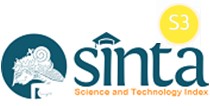Kesesuaian Taman Kota di Surakarta Berdasarkan Konsep Kota Layak Anak
Abstract
Surakarta City is one of a city in Indonesia which has chosen for developing as child friendly city. Child friendly city is the concepts of a city which ensure the rights of children, such as providing city park as recreative and cerative place for children. Therefore, city park in Surakarta should suitable with child friendly city concept. The research question is to know the suitability of city park in Surakarta with the concept of child friendly city. There are five components for assessing this suitability: (1) accessibility, (2) recreation utility. (3) sport utility, (4) supporting facilities and (5) vegetation. The research method uses quantitive method with deductive approach and scoring analysis technique. The result shown that all of city park in Surakarta is not suitable with the criteria above. From the research, we can conclude that is Surakarta should increase the quantity and quality of whole components of city park based on the child friendly concept. Therefore, child friendly city in city park can be implementated and have the impact to guarantee the needs of children for playing in comfortable and safe park.
Keywords
Full Text:
PDFReferences
BAPERMAS. 2013. Profil Anak Kota Surakarta. Surakarta : BAPERMAS
Barlett, Sheriden. 2002. Children’s Rights and the Physical Environment - a Review of Current Knowledge. Sweden : Save the Children Sweden
Carmona, Matthew. Tim Heath. Taner OC. Sreve Tiesdell. 2003. Public Space Urban Space. Architectural Press : UK
Glesson, Brendan. Neil Sipe. 2006. Creating Child Friendly Cities : Reinstating Kids in The City. Routledge : USA
Hart, Roger. Pamela Wridt. 2011. The Child Friendly Community Assessment
Tools A Facilitator’s Guide to Local Assessment of Children’s Right. New York University : USA
Ismail. 2006. Education Game. Yogyakarta: Pilar Media
Joga, Nirwono. 2013. Gerakan Kota Hijau. Jakarta : PT Gramedia Pustaka Utama
Kustianingrum, Dwi. Angga Kusumah Sukarya. Rifan Athariq Nugraha. Franderdi Rachadi Tyagarga. 2013. Fungsi dan Aktifitas Taman Ganesha sebagi Ruang Publik di Kota Bandung. Reka Karsa. No. 2. Vol. 1
Monks, F.J, AMF, Knoers. Sri Rahayu Haditono. 1982. Psikologi Perkembangan : Pengantar dalam Berbagai Bagiannya. Jogyakarta : UGM Press
Mulyana, Rosgandika. 2005. Metode Penelitian. Bandung : Alfabeta
Omid, Rismanchian & Amin Rismanchian. Children Participation in Planning Processes : The Case of Child Friendly City Project in Post-Earthquake Bam, Iran. Urban Design International 12, 143-154. 2007
Peraturan Menteri PP dan PA Nomor 12 tahun 2011 tentang Indikator Kabupaten/Kota Layak Anak
Peraturan Menteri PU Nomor 03/PRT/M/2014 tentang Pedoman Perencanaan, Penyediaan, Dan Pemanfaatan Prasarana Dan Sarana Jaringan Pejalan Kaki Di Kawasan Perkotaan
Peraturan Menteri PU Nomor 05/PRT/M/2008 tentang Pedoman Penyediaan dan Pemanfaatan RTH di Kawasan Perkotaan
Riggio, Eliana. 2002. Child Friendly Cities : Good Governance in The Best Interest of The Child. Environment and Urbanization, Vol. 14, No. 2, October 2002
Siregar, Hari H. 2015. Tingkat Kenyamanan Taman Kota sebagai Ruang Interaksi Masyarakat Perkotaan. Temu Ilmiah IPLBI
Subiyakto, Rudi. 2012. Membangun Kota Layak Anak: Studi Kebijakan Publik di Era Otonomi Daerah. Sosio Religia, Vol. 10, No.1, Februari 2012
Sugiyono.1999. Metode Penelitian Bisnis. Alfabeta : Bandung
UNICEF. 2004. Building Child Friendly Cities, A Fraework for Action. UNICEF Innocenti Research Centre. [27 September 2016]
UNICEF . 2016. What is a Child Friendly City?. [27 September 2016]
Veitch, J., Salmon, J., & Ball, K. (2007). Children ’ s Geographies Children ’ s Perceptions of the Use of Public Open Spaces for Active Free- play, 5.
Widyawati, Karya. Penilaian Ruang Bermain Anak di Kota Depok sebagai Salah Satu Indikator Tercapainya Kota Layak Anak. Faktor Exacta 8 (3) : 195-207, 2015
Wolcock, Geoff. Wendy Steels . 2008. Child Friendly Community Indicators-Literature Review.
Griffith University : Queensland
Yusuf. 2000. Psikologi Anak. PT Suka Buka : Jakarta Selatan
Zulkifli. 1986. Psikologi Perkembangan. Remadja Karya : Bandung
Refbacks
- There are currently no refbacks.


.png)

.jpg)









